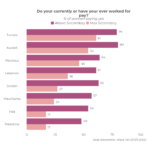This article draws on public opinion survey data from Morocco, Tunisia, Egypt, and Jordan to investigate first, whether a “demand for democracy” in the region exists; second, how to measure it; and third, how respondents understand it. The picture emerging from this analysis is complex, eluding the simple dichotomy between prima facie support and second order incongruence with democracy, which characterises current debates. Respondents have a more holistic understanding of democracy than is found in current scholarship or indeed pursued by Western or regional policymakers, valuing civil-political rights but prioritizing socio-economic rights. There is broad consensus behind principles of gender equality, but indirect questions reveal the continuing influence of conservative and patriarchal attitudes. Respondents value religion, but do not trust religious leaders or want them to meddle in elections or government. Moreover, while there is broad support for conventionally-understood pillars of liberal democracy (free elections, a parliamentary system), there is also a significant gap between those who support democracy as the best political system in principle and those who also believe it is actually suitable for their country.
Visit External SiteTopics
- Charity2
- Corruption113
- COVID-1969
- Democracy35
- Discrimination13
- Economy225
- Education51
- Environment36
- Extremism19
- Freedoms50
- Gender Issues159
- Governance253
- Health44
- International Relations192
- Labor Market34
- Media31
- Migration63
- Political Institutions213
- Political Participation33
- Political Systems60
- Refugees6
- Religion118
- Security31
- Social Justice44
- Wellbeing2
- Youth75


